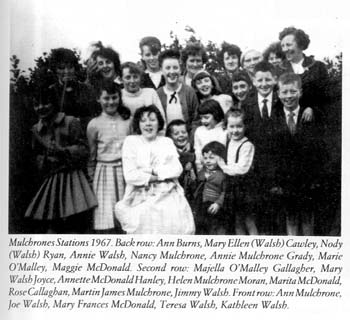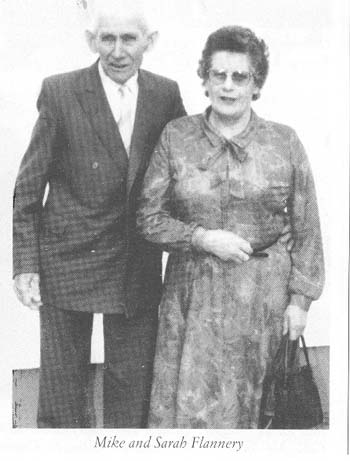

THE Stations was a great event in years past. The woman of the house was getting ready for the occasion for months beforehand. The house had to be cleaned from top to bottom. Rooms were thoroughly cleared out and any unwanted articles went to the rubbish heap for burning.
The presses and cupboards were washed and the chairs and tables scrubbed. The delicate china which had been in the family for years was taken out and carefully washed. The kitchen ceiling took on a new look, when the bags were replaced -this procedure was done by spread- ing canvas bags on the street outside the house and painting them with a mixture of limestone and size, then they were nailed to the rafters with harness tacks. The centre of the ceiling between the collar ties was left uncovered to prevent rats and mice nesting. This gave the gloomy kitchen a bright new look. The walls were then white- washed and the chairs painted. New net curtains were hung neatly on the windows. The cailleach (outshot) also got a face lift with pretty curtaining and frilly valance. The flagged floor would be scrubbed and the pointing between the flags repaired where necessary.
While the woman of the house and her helpful neighbours were busy indoors the men were doing the outside clean-up, gates fixed, pillars repaired and gravel brought from the gravel pit to resurface the boreen. Then the outside walls were whitewashed and the windows cleaned. All this work would be comp1eted the night before the stations and as there were only two bedrooms and a kitchen in most thatched cottages some of the beds would be transferred to the outhouses so that the bedrooms could be left in readiness for the morning. One bedroom would be used as a Confessional and the other as a dining-room. The Mass was celebrated in the kitchen.
 |
 |
The breakfast table was set the previous night with a white table-cloth and the best china. Fresh brown bread and white currant cake were baked in the pot oven. Fresh butter was tastefully curled and arranged in a glass butter-dish set beside a dish of homemade marmalade. Cubed sugar was purchased for the special occasion. The cruet set and the matching egg cups which were seldom used were in place for the boiled eggs which would be served for breakfast.
The kitchen table was used for the altar. It was dressed with the best white linen tablecloth and decorated with wild flowers gathered by the younger members of the family. Brass candlesticks, usually family heir looms also took their place on the altar. A basin of water left on the end of the altar for the priest to bless before the Mass started.
There was an air of excitement about the house. It was a great day for the whole village. Young and old turned out in their Sunday best.
At last the two priests arrived accompanied by two altar boys who carried the Mass-Box which contained a crucifix, vestments, wine and altar bread and a brush for sprinkling the Holy Water. Confessions were held first: One of the priests would hear confessions while the other made his preparations for the Mass.
As the Mass commenced everyone got on their knees on the flag floor and the Mass was offered for the deceased members of the family. The station dues were left on the table afterwards and the priest confirmed who was to have the next station.
The kettles were boiling on the crooks over the open hearth fire. Priests and servers were in the first sitting for breakfast and a few adults. There was full and plenty for everyone, a bowl of fruit was passed around to the children. When the priest was finished breakfast he visited the old people in the village who could not attend the Mass.
When all was over everyone relaxed and by the next day everything was back to normal except for the odd item which had been so carefully hidden out of sight and could not be found for months.